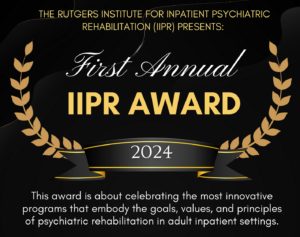IIPR Award
 The winner of the first annual IIPR Award is….
The winner of the first annual IIPR Award is….
The Bleyzer Program
Submitted by: Tyson Keller
Location: Moccasin Bend Mental Health Institute, Tennessee
Program Description: The name of the program we are nominating is the Bleyzer Program. The Bleyzer program functions as a specialized program at Moccasin Bend Mental Health Institute (MBMHI). MBMHI is one of four Regional Mental Health Institutes in the Tennessee operated by TN Department of Mental Health and Substance Abuse Services. This program was named for Dr. Gedaly Bleyzer, a former MBMHI psychiatrist who defected from Russia to the United States due to religious and political persecution. Dr. Bleyzer, once a prominent cardiothoracic surgeon in his homeland, took up psychiatry upon coming to the United States and practiced at MBMHI until his passing in 1995. He was a beloved, well-respected, and devoted clinician so much so that one of the properties at MBMHI is named in his honor.
Goals of the Program: The program was designed to serve patients who have been in the clinical inpatient setting for anextended period of time and is designed to prepare them for discharge and community reintegration.The goal of the program is to help patients build or develop their functional skills that will help them in their transition back into the community. These functional skills deficits can create barriers to discharge readiness and community placement for our patients.
Abstract: The Bleyzer program exemplifies the goals, values, and principles of psychiatric rehabilitation by providing a program of recovery that helps individuals gain or refine independent living skills, confidence and self-esteem, work toward individual goals and obtain the tools needed in the community upon discharge. This is achieved through a “community living” approach. The patients work together to complete chores, plan and prepare meals including shopping in the community. The mission of the program is to “Blaze new trails back into the community through facilitation and practice of vocation, support, and knowledge of recovery”. I believe the Bleyzer Program should win the IIPR Award because we have seen the positive impact of our program on the patients it serves. We have seen 36 patients complete this program. Three patients have returned to the hospital giving us a 92% success rate. Those three individuals returned for a medication adjustment or need for new placement and length of stay was less than one month.
In 2020, a 27-year-old patient was admitted who suffered from severe and debilitating social anxiety and depression with overwhelming feelings of worthlessness and suicidal ideations. She had decompensated to the point she began having trouble managing the basic tasks of daily living. She was withdrawn and would decline to engage with others and avoid eye contact. After completing the program, she was soon ready for discharge. Upon discharge she continued to apply and develop the skills she learned in Bleyzer. She returned to Chattanooga on a mission to continue “BLEYZING” through life. When asked, what impact The Bleyzer Program had on her she replied, “Bleyzer helped me to find and see myself as more than a person with a mental illness, and it taught me how to believe in myself and that I could have a real life”.
CONGRATULATIONS!